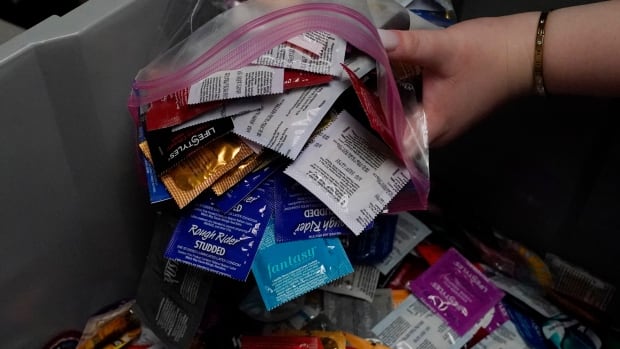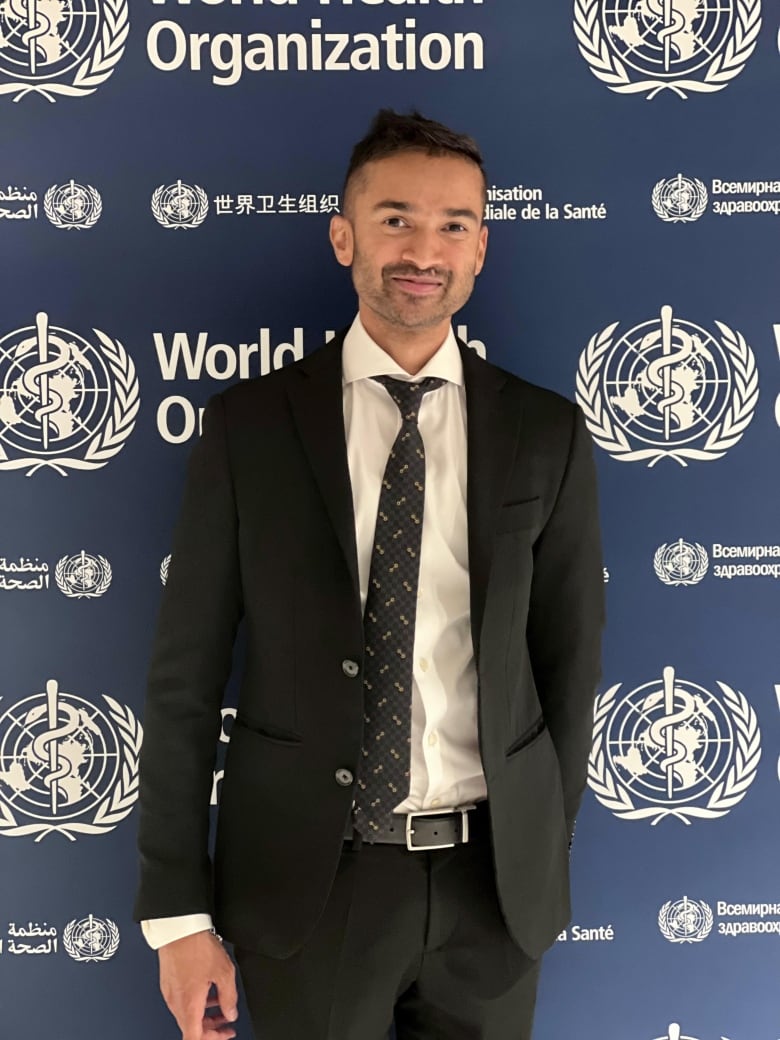
The bowl of free condoms in the student office might need to be dusted off.
A recent report based on surveys of 15-year-olds in 42 countries, including Canada, shows what the World Health Organization called a worrying decline in the use of condoms, which provide protection from unintended pregnancies and sexually transmitted infections (STIs).
In Canada, roughly two-thirds of teens surveyed who said they had sex in the 2021-22 school year didn’t use a condom the last time they had intercourse. That decline in condom use, down two percentage points for boys and four for girls since 2014, occurred as teens saw a gap in sex-ed lessons during the height of the COVID-19 pandemic, health experts told CBC News.
In August, the Public Health Agency of Canada noted rates of chlamydia, gonorrhea and infectious syphilis have all been trending upward. Canada also saw a nearly 25 per cent increase in new HIV diagnoses in 2022 over 2021, with Saskatchewan and Manitoba leading with the highest rates.
While the federal reports don’t provide an age breakdown, Canadians can gain some insight through the Health Behaviour in School-aged Children survey, the basis for the latest WHO report. The survey is an ongoing cross-national research study of youth aged 11 to 15 to gain insight into their well-being, health behaviours and social contexts.
Though condom use has dropped, the percentage of teens who are sexually active — one in five, according to the WHO report — has been pretty stable since 2014.
Given the findings of the report, the founder of LetsStopAIDS said it’s clear Canada needs to reform sexual education province by province.
The youth-driven charity runs sexual health workshops for teens and young adults in Ontario and Saskatchewan. In those workshops, youth can play games, ask questions and openly talk about sexuality and their health.
“If our political parties are not interested to have discussions about our youth and their sexual journey, this will continue to be under the carpet,” said Shamin Mohamed Jr., the group’s founder and director.
Mohamed notes Canada now ranks at the bottom of G7 nations in preventing new HIV infections, which he said “makes no sense.” He attributed it to a lack of accessible and affordable prevention and treatment, particularly in rural areas.
Female entrepreneurs are behind two Canadian companies attempting to change how people think about sexual wellness with new brands of condoms. Sexually transmitted infections are on the rise and they want young people to take control of their sexual health.
Sex-ed has increasingly come under attack in recent years because of the false premise that it encourages sexual behaviour in youth, said Dr. Hans Kluge, WHO Europe regional director, who was involved in the report.
“Unfortunately, when you get that kind of political pushback about sexual health education, that means that young people who may be making decisions about being sexually active … are not given the information they need,” said Elizabeth Saewyc, director of the School of Nursing at the University of British Columbia.

Saewyc said young people need culturally relevant and medically accurate information about safer sex and consent. Another key piece is making confidential health care more accessible — making sure youth can get affordable condoms or prescriptions for birth control pills and other forms of contraception.
“If you have income challenges or you need parents to provide funding or to help with that prescription, that’s going to be a barrier,” said Saewyc, who started her career as a nurse working with pregnant adolescents.
In the new report, Canada’s rate on use of birth control pills was unchanged, she said, with 36 per cent of female respondents using it.
Ivano Decotiis, 18, of Mississauga, Ont., said the teens he knows don’t view condoms in a positive light.
“STI prevention and pregnancy prevention now is seen as preventable through other means, through medication and through abortion access,” Decotiis said. “Condom usage is never discussed or talked about. It’s just not something that is in teenage consciousness.”
More misconceptions online
During the pandemic, myths and misconceptions about sex flourished, said Jessica Wood, who conducts research about those aged 18 to 24 for the Sex Information and Education Council of Canada.
Youth turned to each other for information, Wood said, when classes stopped, sexual and reproductive health clinics closed and school nurses or social workers weren’t available.
“I do think we are seeing more misinformation online about sexual health,” she said. “We’ve seen over the years that the percentage of people who say they’ve used a condom the last time they had penis/vagina sex has dropped along with the percentage of people who say they are concerned about sexually transmitted infections.”

Since not all sexually transmitted infections have symptoms, people may unknowingly pass the infection on to new or existing partners if they’re not using a barrier form of protection.
Barriers include condoms or dental dams which can be combined with medication like pre-exposure prophylaxis (PrEP) pills, which prevent HIV, or doxyPEP, which prevents other sexually transmitted infections.
But prevention campaigns may not have kept up, the experts say.
Health professionals also need to “up our game” on providing better, more consistent information that’s non-judgmental — and not just during school hours, Saewyc suggested.
Also critical is making protection accessible, experts told CBC — such as providing condoms in free vending machines in public washrooms.
“We cannot victimize and shame young people for having sex,” Mohamed said. “I think understanding and listening is something that we, as a country, can do much more.”
